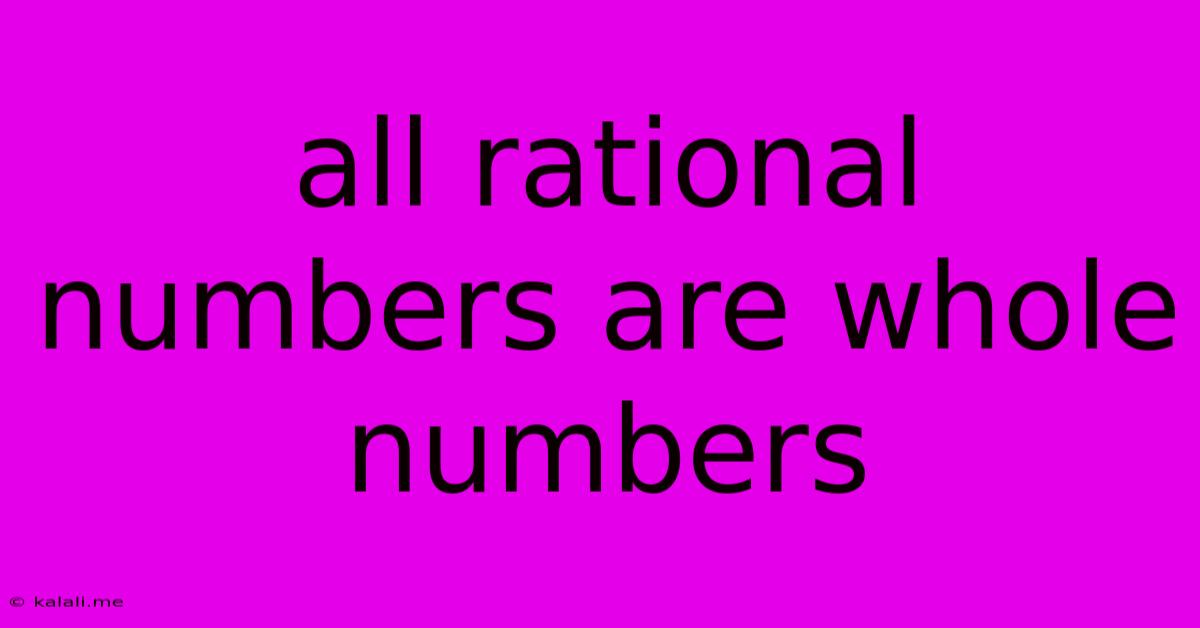All Rational Numbers Are Whole Numbers
Kalali
Jun 07, 2025 · 2 min read

Table of Contents
Are All Rational Numbers Whole Numbers? A Deep Dive into Number Sets
Meta Description: This article explores the relationship between rational and whole numbers, clarifying whether all rational numbers are whole numbers and explaining the key differences between these number sets. We'll examine definitions and provide examples to illustrate the concept.
The statement "all rational numbers are whole numbers" is false. While there's an overlap between rational and whole numbers, whole numbers only represent a subset of rational numbers. Understanding the difference requires a clear grasp of what defines each number set.
Understanding Rational Numbers
Rational numbers are any numbers that can be expressed as a fraction p/q, where 'p' and 'q' are integers, and 'q' is not equal to zero. This broad definition encompasses a wide range of numbers. Examples include:
- Whole numbers: Numbers like 0, 1, 2, 3, etc., can be written as fractions (e.g., 2/1, 5/1).
- Fractions: Numbers like 1/2, 3/4, -2/5, etc., are explicitly expressed as fractions.
- Terminating decimals: Decimals that end, like 0.75 (which is 3/4), are rational because they can be expressed as fractions.
- Repeating decimals: Decimals with a repeating pattern, like 0.333... (which is 1/3), are also rational, even though their decimal representation is infinite.
Understanding Whole Numbers
Whole numbers are simply the non-negative integers: 0, 1, 2, 3, and so on. They are a subset of integers, which in turn are a subset of rational numbers. The key characteristic is the absence of negative numbers and fractions.
Why the Statement is False
The crucial point is that many rational numbers cannot be expressed as whole numbers. Consider these examples:
- Fractions: 1/2, 2/3, and 7/8 are all rational numbers, but none of them are whole numbers.
- Negative numbers: -1, -2/5, and -3 are all rational but not whole numbers. Whole numbers are always non-negative.
- Decimals (non-integers): 0.5, 1.7, and -2.2 are all rational but not whole numbers.
The Relationship: Subsets and Supersets
The relationship between rational and whole numbers can be visualized using set theory. The set of whole numbers is a subset of the set of rational numbers. Conversely, the set of rational numbers is a superset of the set of whole numbers. This means all whole numbers are rational, but not all rational numbers are whole numbers.
Conclusion
To summarize, the statement "all rational numbers are whole numbers" is incorrect. While all whole numbers are indeed rational, the rational number set is significantly larger, encompassing fractions, negative numbers, and decimals that are not whole numbers. Understanding these fundamental differences is crucial for grasping core concepts in mathematics and number theory.
Latest Posts
Latest Posts
-
Can You Go Back For Riddler Trophy
Jun 07, 2025
-
Why Is My Car Creaking When I Turn
Jun 07, 2025
-
From Your Knowledge Of X And Y In The Equation
Jun 07, 2025
-
Gfci Outlet Not Working After Power Outage
Jun 07, 2025
-
Ex Tenant Keep Shipping To My Place
Jun 07, 2025
Related Post
Thank you for visiting our website which covers about All Rational Numbers Are Whole Numbers . We hope the information provided has been useful to you. Feel free to contact us if you have any questions or need further assistance. See you next time and don't miss to bookmark.